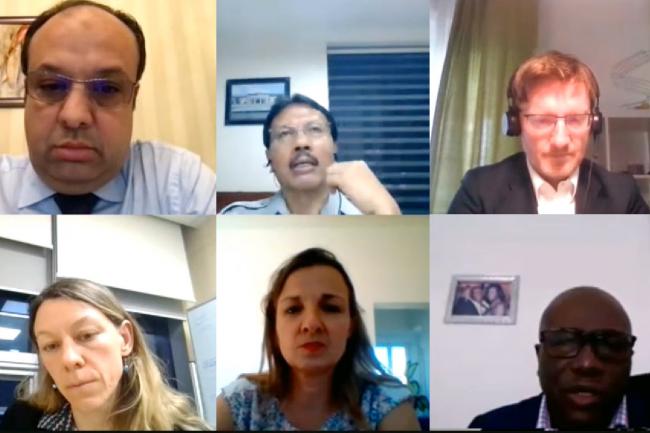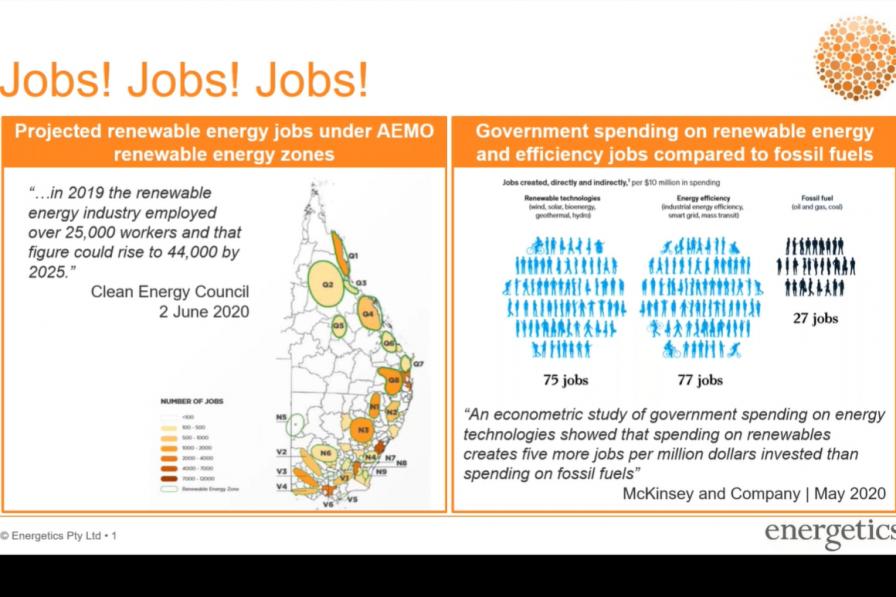The June Momentum for Climate Change, a series of virtual events organized by the UN Framework Convention on Climate Change (UNFCCC) Secretariat, continued Monday.
Koronivia Joint Work on Agriculture information event
Subsidiary Body for Implementation (SBI) Chair Marianne Karlsen (Norway) opened the event, aimed at providing updates on work under the Koronivia Joint Work on Agriculture (KJWA), noting that four out of six workshops mandated had been organized and the outcomes will be reported to the 26th session of the Conference of the Parties (COP 26).
Party reflections
Party representatives reflected on lessons learned from work under the Koronivia road map and the KJWA.
Fahmuddin Agus (Indonesia, for the Association of Southeast Asian Nations Negotiators Group on Agriculture) shared how his group has coordinated positions under the KJWA and is exploring applying for Green Climate Fund (GCF) readiness funding.
Herwig Ranner (EU) highlighted as lessons: various types of support available through UNFCCC and UN bodies; no “one-size-fits-all” solutions for resilience and sustainability; the need for further research; and the importance of stakeholder engagement.
Ayman Amin (Egypt, for the Group of 77 and China) reminded that work on agriculture under the UNFCCC started in 2012 and called for moving to implementation, possibly through a permanent body, such as a group of experts or standing committee, and for sustainable means of implementation for developing countries.
Claire Cvitanovich (US) commended the KJWA’s technical exchanges and queried about translating this into productive implementation. She noted the US aims to increase agricultural productivity by 40% by 2050 while halving environmental impact.
Walter Oyhantcabal (Uruguay) explained his country’s nationally determined contribution (NDC) integrates agriculture, which generates 75% of national emissions, and said Koronivia has informed national policies. He called for identifying further ways to mobilize resources for local-level implementation.
FAO and GCF perspectives
Julia Wolf, Food and Agriculture Organization of the UN (FAO), and Janie Rioux, Green Climate Fund (GCF), shared lessons from Koronivia and available support. Wolf said the workshops helped identify needs, gaps, and constraints and increase trust. She said the FAO facilitated exchanges, provided technical assistance, and promoted knowledge sharing.
Rioux said the GCF took note of the importance of co-benefits, including mitigation, adaptation, food security, and biodiversity, for cost-effective financing. She explained the GCF has three support “windows”: project and programmes funding; project preparation support; and readiness support.
Questions and answers and closing
Subsidiary Body for Technological and Scientific Advice (SBSTA) Chair Tosi Mpanu-Mpanu (Democratic Republic of the Congo) moderated. On updating the Koronivia road map, he explained parties can propose future topics. Amin suggested a focus on food supply chains.
Ranner stressed the importance of coordination in-country and among international bodies to ensure mainstreaming of agriculture and climate change. Oyhantcabal proposed developing a Koronivia knowledge hub.
Julio Cordano (Chile, COP 25 Presidency) highlighted how Koronivia acted as a catalyst for regional collaboration. Maggie Charnley (UK, incoming COP 26 Presidency) said the UK will build on its Just Rural Transition vision launched in 2019.
UNFCCC Technology Mechanism Update
Stephen Minas, Vice-Chair, Technology Executive Committee (TEC), moderated. Daniele Violetti, UNFCCC Secretariat, highlighted the role of climate technology in assisting countries to build back better from the COVID-19 pandemic, while increasing climate ambition.
Updates from the Technology Mechanism
Mareer Husny, TEC Chair, said the Committee is on track to deliver on its workplan. He highlighted publications on good practices of technology needs assessment implementation, the uptake of existing technology, and coastal zones.
Orly Jacob, Climate Technology Centre and Network (CTCN) Advisory Board Chair, highlighted the Board’s work providing technical assistance for initiatives and technology choices for a green recovery. Among these efforts she noted national circular economy roadmaps, transformative technologies, adaptation technologies, and nature-based solutions.
Rose Mwebaza, Director, CTCN, announced that the Network will establish regional offices in Africa, Latin America, and the Asia Pacific. She reported decreased demand for the Network’s assistance during the COVID-19 emergency.
Panel discussion
During a discussion on the role of technology in building back better, Mary Stewart, Energetics, said that the private sector is struggling to operate in an uncertain environment. She noted this is an opportunity for governments to set clear outcomes for policies and future funding, be they targets for NDCs or for sectors.
Anand Tsog (Mongolia) said climate-smart technologies are efficient, while also delivering co-benefits such as improved health. She observed that such technologies could be attractive given current restraints on public budgets.
Henrique Schneider, Swiss Federation of Small and Medium Enterprises, stressed the role of endogenous technologies, saying most small and medium enterprises are already innovating. He rejected the idea that local technologies may not be scalable, arguing they can facilitate learning to replicate solutions.
Roland Roesch, International Renewable Energy Agency (IRENA), shared IRENA’s project facilitation tools and platforms. He welcomed countries’ plans to invest in renewable energy as a COVID-19 recovery policy, and said many developed countries are interested in funding developing countries’ renewable energy-based NDCs.
In the discussion, panelists responded to questions on the role of technology incubators and on “low-hanging fruit technologies” in COVID-19 recovery, with Stewart noting these are country-specific.
Selected Photos
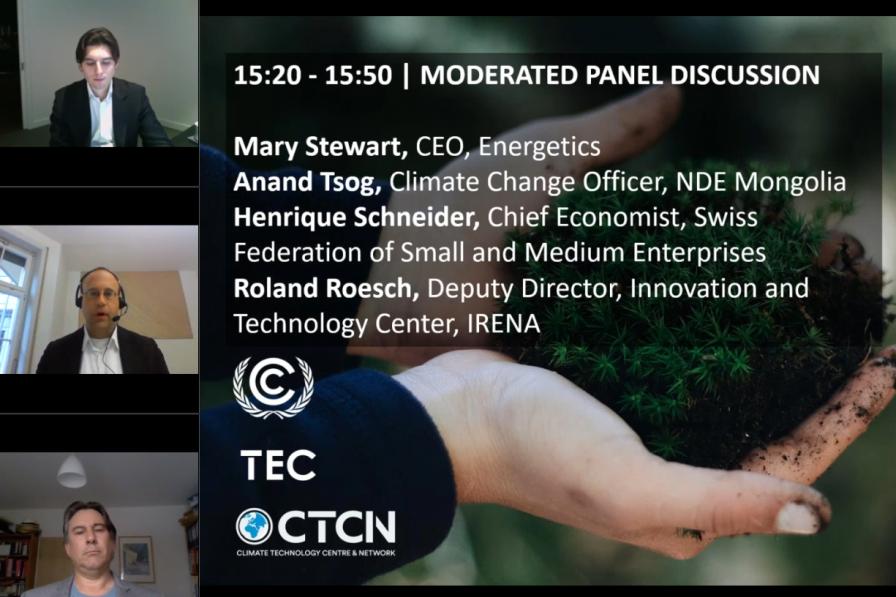
Technology Mechanism event panelists (from top): Stephen Minas, Vice-Chair, Technology Executive Committee; Henrique Schneider, Swiss Federation of Small and Medium Enterprises; and Roland Roesch, International Renewable Energy Agency (IRENA)

Technology Mechanism event speakers (from top): Orly Jacob, Chair, CTCN Advisory Board; Stephen Minas, Vice-Chair, Technology Executive Committee; Rose Mwebaza, Director, CTCN; and Mareer Husny, Chair, TEC
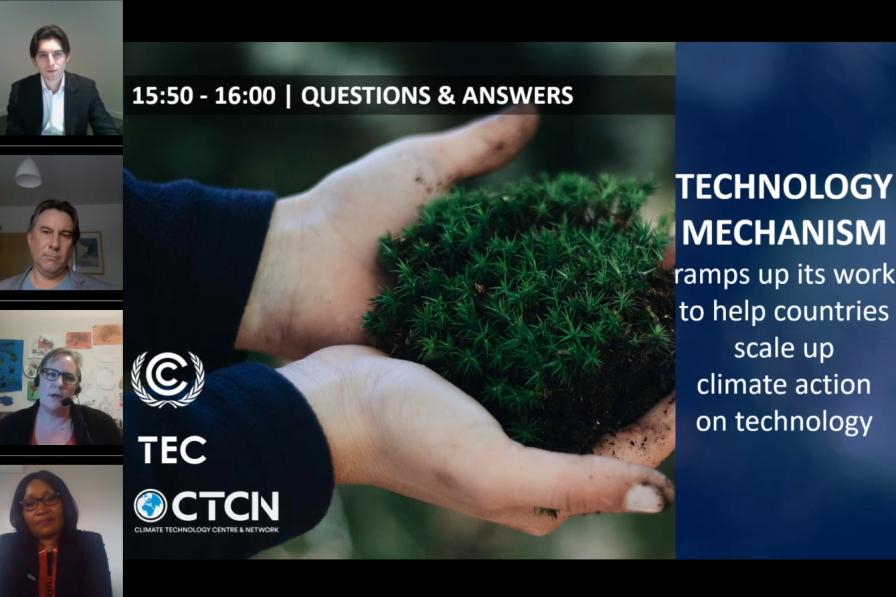
Technology Mechanism event panelists (from top): Stephen Minas, Vice-Chair, Technology Executive Committee; Roland Roesch, International Renewable Energy Agency (IRENA); Mary Stewart, Energetics; and Rose Mwebaza, Director, CTCN
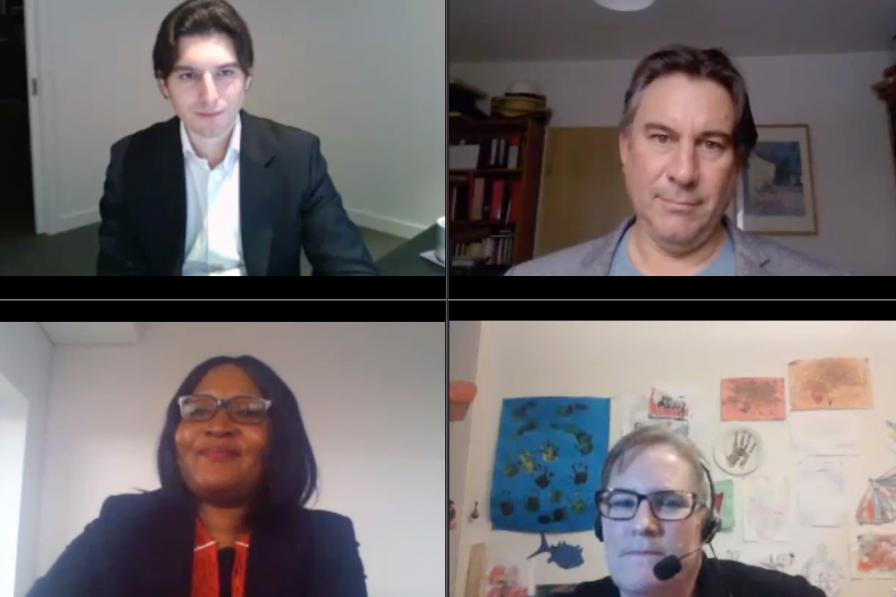
Technology Mechanism event panelists (clockwise from top left): Stephen Minas, Vice-Chair, Technology Executive Committee; Roland Roesch, International Renewable Energy Agency (IRENA); Mary Stewart, Energetics; and Rose Mwebaza, Director, CTCN
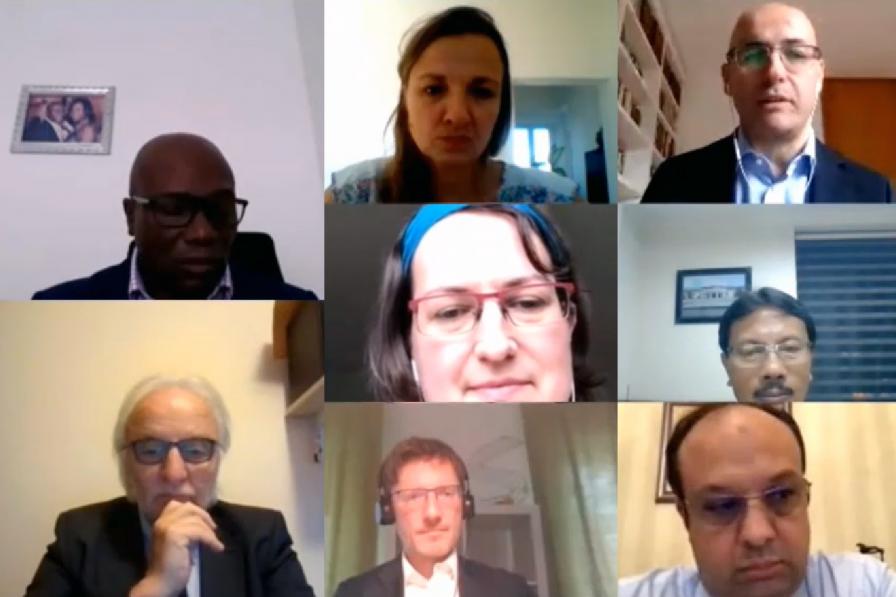
Koronivia event speakers (from top left): Tosi Mpanu-Mpanu, Subsidiary Body for Technological and Scientific Advice (SBSTA) Chair (Democratic Republic of the Congo); Julia Wolf, Food and Agriculture Organization of the UN (FAO); Julio Cordano, Chile, COP 25 Presidency; Fahmuddin Agus, Indonesia, for the Association of Southeast Asian Nations (ASEAN) Negotiators Group on Agriculture; Ayman Amin, Egypt, for the Group of 77 and China; Herwig Ranner, EU; Walter Oyhantcabal, Uruguay; and Maggie Charnley, UK, incoming COP 26 Presidency (middle)
